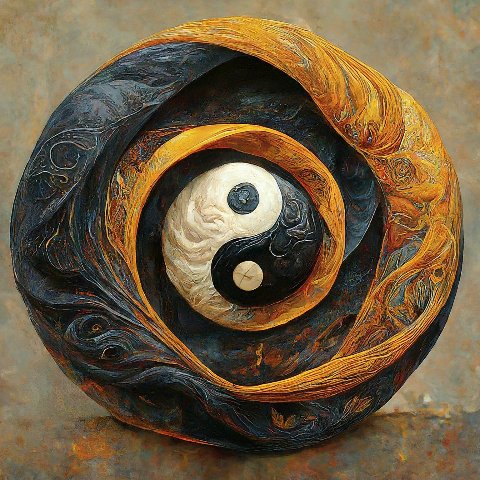The Duality of Breath Yin and Yang
Cultivating Inner Power
By: Cheng Tong - May 13, 2024
Daoism, an ancient Chinese philosophy and spiritual tradition, places immense importance on the breath. Far from a simple biological function, the breath in Daoism is considered the bridge between the physical and the spiritual, a wellspring of vitality, and a key to cultivating harmony with the Dao, the universal flow of all things.
Qi: The Vital Breath
The core concept in Daoist understanding of the breath is Qi (pronounced “chee”). Qi is not simply oxygen, but a subtle energy force believed to permeate all living things and the universe itself. It is the dynamic interplay of Yin and Yang, the fundamental polarities that govern existence. Deep, mindful breathing is seen as a way to cultivate and refine Qi, leading to improved health, inner peace, and a deeper connection to the Dao.
The Duality of Breath: Yin and Yang
Daoism recognizes two aspects of breath, reflecting the Yin and Yang principles.
- Yang Qi: Associated with the inhale, Yang breath is vigorous, expansive, and stimulating. It is linked to activity, alertness, and the external world.
- Yin Qi: Correlated with the exhale, Yin breath is slow, calming, and introspective. It connects to rest, relaxation, and the inner world.
Through mindful breathing practices, Daoists aim to achieve a state of balance between these two aspects, fostering harmony within the body and aligning oneself with the natural rhythms of the universe.
Breathing Techniques: Cultivating Inner Power
Daoist breathing exercises, often practiced in conjunction with meditation and movement forms like Tai Chi and Qigong, focus on cultivating a smooth, deep, and natural breath. Here are some key features:
- Diaphragmatic Breathing: Unlike shallow chest breathing, Daoist techniques emphasize engaging the diaphragm, the dome-shaped muscle below the lungs. This allows for deeper and fuller breaths, maximizing oxygen intake and promoting relaxation.
- Nasal Breathing: Breathing through the nose is considered optimal, as it filters and warms the air, and is believed to have a calming effect on the nervous system.
- Visualization: Daoists often incorporate visualization techniques into their breathing practices. For example, one might imagine inhaling pure white light symbolizing Yang Qi, and exhaling darkness representing Yin Qi.
Benefits of Daoist Breathing
By cultivating a mindful and balanced breath, Daoists believe practitioners can experience a multitude of benefits, including:
- Improved Physical Health: Deeper breathing can enhance lung function, improve circulation, and promote relaxation, leading to a stronger immune system and reduced stress levels.
- Enhanced Mental Clarity: Focusing on the breath can quiet the mind, reduce anxiety, and improve focus and concentration.
- Increased Vitality: Daoists believe regulated breathing practices can cultivate and strengthen their internal Qi, leading to a greater sense of vitality and well-being.
- Spiritual Connection: Mindful breathing is seen as a bridge between the physical and the spiritual, allowing practitioners to connect with the Dao and experience a sense of inner peace and unity.
Specific Breathing Techniques in Daoism
There are numerous Daoist breathing techniques, each with its own focus and purpose. Here are two prominent examples:
- Tu Na: This fundamental technique emphasizes slow, deep, and rhythmic breathing through the nose. Practitioners focus on filling the lower abdomen with air on the inhale (Yang) and gently exhaling, visualizing the release of tension.
- Tai Hsi (Embryonic Breathing): This more advanced practice aims to cultivate a state of deep relaxation and inner stillness. It involves very slow, shallow breaths, similar to the subtle breathing of an embryo in the womb.
The Breath: A Lifelong Journey
In Daoism, the cultivation of the breath is not a quick fix, but a lifelong practice that deepens with time and dedication. By integrating mindful breathing into daily life, practitioners can cultivate a sense of inner peace, vitality, and a deeper connection with the natural world and the flow of the Dao.
Whether you’re a seasoned meditator or just beginning to explore Daoist principles, focusing on your breath is a simple yet powerful tool for enhancing your physical and spiritual well-being. So next time you take a breath, take a moment to appreciate the life force it represents and how it can connect you to the vastness of the Dao.

